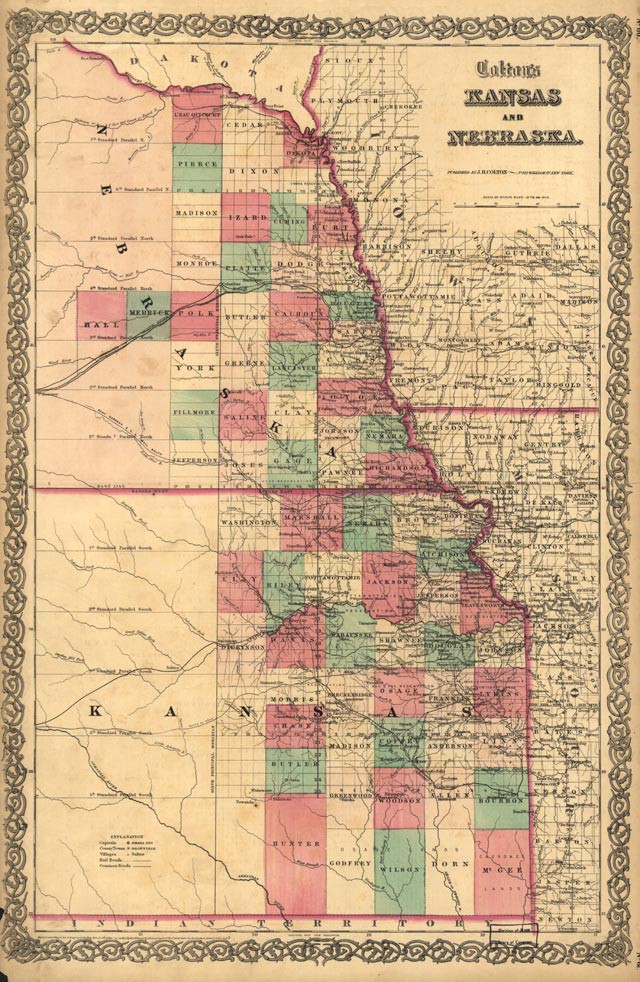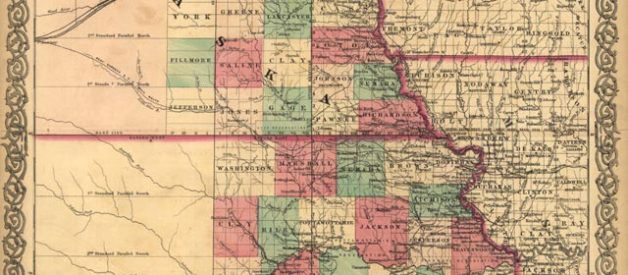 By US gov (US gov) [Public domain], via Wikimedia Commons
By US gov (US gov) [Public domain], via Wikimedia Commons
The Kansas-Nebraska Act of 1854 was a huge catalyst in sending the nation to the Civil War. This act reversed the Missouri Compromise and allowed slavery in the remainder of the original areas of the Louisiana Purchase. The balance of power shifted in the government and across the land.
This one act was a political panic attack as many against the act felt that it would ?allow slaveholders to dominate the new states of the West? opening the way for the Southern states to dominate the governing of the nation and ?to make the North a permanent minority.? (1) Keep in mind that these were two different cultures living as one country. Neither one wanted the other to have control over their people.
Slavery Was Only Part of It
Slavery was only part of the issue. It came down to the two major regions of the nation and who would be in control. This fear of losing position in Congress began the creation of the Republican party. The act showed the possible shift in government majority. This helped to lead to the Civil War as it increased the tensions between the two areas and gave it more fuel to pour on the sputtering fire.
This one act brought old fears back to the surface and opened the door for more fuel that became readily available. It was even more powerful when it was pushed to have Kansas be admitted as a slave state despite the fact that ?a clear majority? of those that lived in Kansas opposed slavery. (2) Common sense was less and less being applied as it became a pawn for power.
Impact of Dred Scott Case
From the Kansas-Nebraska Act, another can of fuel called the Dred Scott Decision was poured onto the fire. In 1857, a slave petitioned the courts for his freedom based on the fact that he lived in a territory for several years that did not allow slavery. The full extent of the slavery issue became evident as the Dred Scott decision went beyond saying Scott was still a slave.
The Supreme Court?s decision also announced that the ?Missouri Compromise?s prohibition of slavery north of thirty-six degrees thirty minutes was unconstitutional.?(3) This meant that all the laws prohibiting slavery in the territories were unconstitutional. The question of Congress? power came into play. It was more fire as the fear of loss of power again consumed the political leaders and their constituents. Tensions between the North and South were growing.
Unsatisfactory Election
The election of 1860 of Abraham Lincoln to the office of the President of the United States was the final straw for the South. Though Lincoln was willing to compromise with the South, many Northerners refused to go along with him and many Southerners refused to accept it. Many on both sides wanted all or nothing. (4)
War was inevitable when neither side is fully willing to work with the other side for peace. State by state appeared to fall under Northern power giving an increase in the ?anti-southern tone of the northern Democrats?. (5)
South Could Not Be Pacified
The slavery extension issue that flared up during the Kansas-Nebraska Act was the foul taste in both sides? mouths. Neither side believed the other side nor trusted it. The moderate view of Lincoln was not believed by a vast majority in the South. (6) With the change in the northern Democrats view on their fellow Democrats in the South, this was understandable. As time went on, the South began to feel as though it was victimized. They saw the government in the hands of Republicans as an administration with the mission to implement the ?radicals? program of indirect action against slavery? as well as fear of Lincoln appealing to those in the South that were not slaveholders, mainly the poor white man. (7)
No amount of reassurance from Lincoln was going to satisfy the South. They could not see how anything good was going to come from any Northerner in office whether he was Republican or Democrat. It was the final act in the North versus South drama.
Bibliography
(1) Eric Foner, Free Soil, Free Labor, Free Men : The Ideology of the Republican Party before the Civil War with a New Introductory Essay, (Cary: Oxford University Press, 1995), 105.
(2) Ibid, 121.
(3) Ibid, 119.
(4) Ibid, 267.
(5) Ibid, 361.
(6) Ibid, 360.
(7) Ibid, 361.


